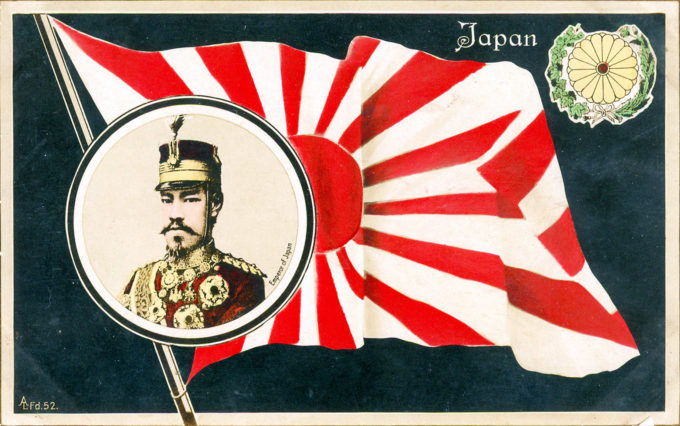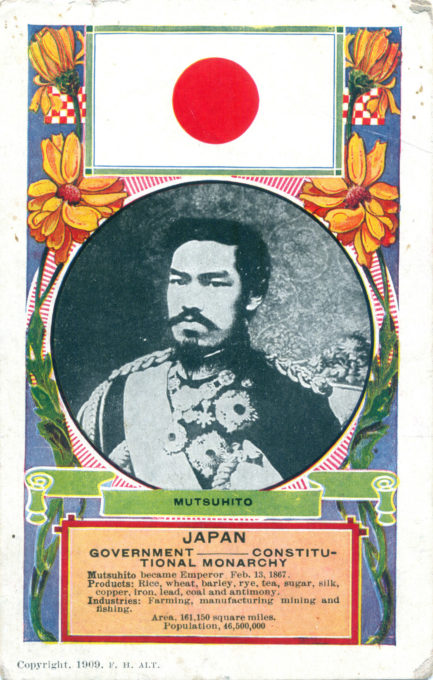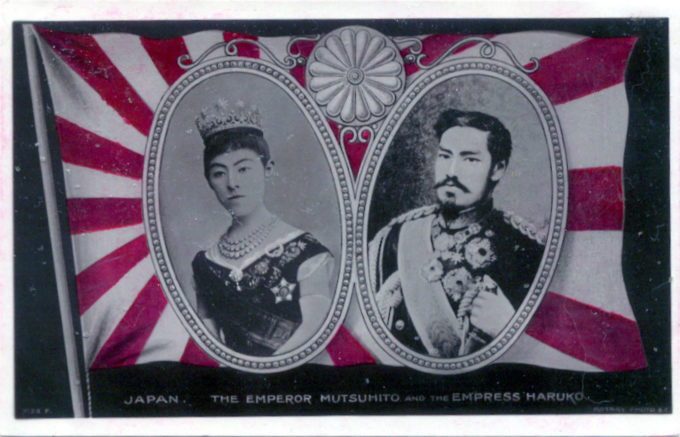
“Emperor of Japan” and the Chrysanthemum Seal, c. 1905, portrayed on this British postcard. Bestowed the posthumous name “Meiji” [“bright reign”], he ruled as Emperor Mutsuhito [“harmonious and benevolent”], the 122nd Emperor of Japan according to the traditional order of succession, reigning from 3 February 1867 until his death on 30 July 1912. Ascending to the throne at the young age of 16, he presided over what is now termed the Meiji era, a time of great change in Japan that witnessed its rapid transformation from an isolationist, feudal state into a modern, industrialized world power.
See also:
Emperor Meiji meets General Grant, 1879.
Emperor Meiji at the Grand Fleet Review, 1905.
Emperor Meiji’s funeral hearse, 1912.
Meiji Shrine Outer Garden & Meiji Memorial Picture Gallery under construction, c. 1925.
“The personality of any man is that which is of most enduring interest to other men. Especially is this true when the man has occupied some high position or accomplished some great work for the world.
Emperor Meiji, 1909, portrayed in a national sovereigns series of postcards collection published in Great Britain.
“… Emperor Meiji was born in 1852, one year previous to the coming of Commodore Perry. From that time, until his accession to the throne at the age of sixteen, he lived amid the political confusion which attended the restoration of sovereignty by the Shogunate to the Crown.
“Few rulers have been placed in more trying circumstances or in circumstances demanding clearer vision – firmer faith; and few, so young in years, have responded so royally to the efforts of devoted councellors.
“In 1871 General Saigo wrote of affairs in the Imperial Household: ‘The Emperor is happiest when among attendants of the samurai class. He … will stay from morning till night at his studies. He spends all his time in the study of Japanese, Chinese, and foreign books. He is attired more plainly than the nobility, and works harder than men of the middle class. Of strong physique, he has also an indomitable will. He has decided to convene the principle officers of the government thrice a month that they may discuss affairs of state before him. The Emperor has put aside all pomp and arrogance, and cherishes most sincere friendship with his subjects.’
“… His position, hemmed in by the ceremony of the Court, prevented the outward display of many of the most striking of his personal characteristics. They are evidenced in poetic words with which he found delight and in which his heart found utterance. Simplicity, sincerity, sympathy, and faith characterized this man of industry, will, and devotion to duty:
I turn the mystic
Pages o’er ; and joy to find,
Within their keeping,
Secrets, garnered in the past,
Opening wide the present’s door.
– Imperial Poems of the Meiji Era, edited by F.A. Lombard, 1915



